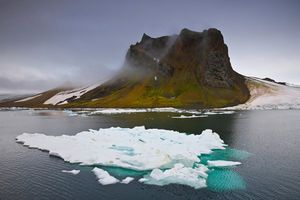Silesian Peaks
The Silesian Peaks is a very long mountain range to the northeast of Patras on the planet of Banas which is a colonized territory of Sayaffallah. The Silesian Peaks extend all the way inland and also all the way to the sea. The total span of the Silesian Peaks is 885 miles in length (1424 kilometers) extending due northeast along the coastline much of it arctic in nature.

The highest peak of the Silesian Peaks is that of the Standlidge Peak at a height of 8850ft (2697 meteres). Much of the Silesian Peaks are glacial in composition with long stretches of ice fields and crevasses in between towering mountain peaks. The mountains are remote, rugged and interspersed with relatively small rural communities around its base and near areas with large amounts of water. The largest of which is the capital of Banas with a total population in excess of 20 million people.
Human interaction with this mountain range is extremely popular due to the many possibilities of outdoor recreation in and around its varied peaks. Popular activities including rock climbing, paragliding, bouldering, canyoning, sea kayaking, hiking, backpacking, BASE Jumping. In December 2016 the government in Banas passed legislation requiring permits to be obtained in the future of all those desiring to summit Silesian Peaks due to the significant erosion found on trailheads leading up to the more challenging portions of the summits required for final ascent. Demand already in 2017 has been significant with over 26,000 applications for permits throughout the year 2017.